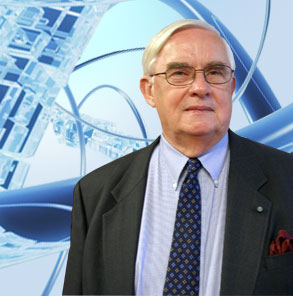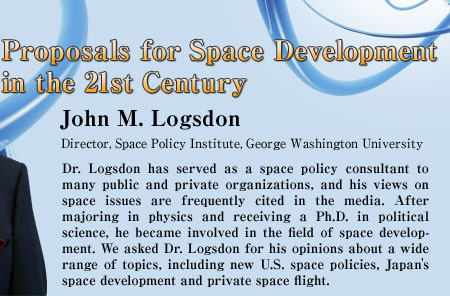

Director of the Space Policy Institute at George Washington University's Elliott School of International Affairs, where he is also Professor Emeritus of Political Science and International Affairs.
Dr. Logsdon has been a faculty member at GW since 1970, and is also faculty member of the International Space University. He holds a B.S. in Physics from Xavier University (1960) and a Ph.D. in Political Science from New York University (1970). Dr. Logsdon's research interests focus on the policy and historical aspects of U.S. and international space activities.
Dr. Logsdon recently served as a member of the Columbia Accident Investigation Board. He is a member of the NASA Advisory Council and a current member of the Commercial Space Transportation Advisory Committee of the Department of Transportation. He is a Fellow of the American Institute of Aeronautics and Astronautics, and the American Association for the Advancement of Science; a member of the International Academy of Astronautics. He is a former member of the Board of Directors of the Planetary Society.
Dr. Logsdon has served as a member of a blue-ribbon international committee evaluating Japan's National Space Development Agency. He has also served on the Vice President's Space Policy Advisory Board, the Aeronautics and Space Engineering Board of the National Research Council, NASA's Space and Earth Sciences Advisory Committee, and the Research Advisory Committee of the National Air and Space Museum. He was the first holder of the Chair in Space History of the National Air and Space Museum.
Q. What research do you do at the Space Policy Institute?
The Space Policy Institute is part of George Washington University's Elliott School of International Affairs. So we have a particular focus on the international dimensions of space activities, working on international cooperation and competition, the history of the world's space programs, what their current activities are. We also train students for careers in space policy and welcome visitors from all over the world to come and study with us.
Q. You served as a member of the Columbia Accident Investigation Board. Why did that accident happen? What lessons did NASA learn from it?
There were multiple causes of the Columbia accident. The technical cause was a piece of foam coming off the Shuttle's external tank and hitting the leading edge of the Shuttle's wing, putting a large hole in it. When the Shuttle re-entered the atmosphere, hot air, at 3,000ºC, got inside the wing structure and basically melted it. And the wing came off, and the Shuttle disintegrated. But in the investigation we discovered that there were many underlying organizational and management causes of the accident. NASA had not been properly managing the Shuttle, had not given it adequate funding, had not treated it like the very risky vehicle it was, and so didn't do a responsible job of the management of the Shuttle program.
So I think the main changes that have happened since the Columbia accident were, first of all, becoming aware of the possibility of the damage that could be caused by foam, and having better inspection techniques and hopefully some repair techniques. But much more, I think it's a different kind of management attention. There is a full concern about the risks of each mission, a very strong focus on safety, not treating the Shuttle as a routine vehicle at all, but as a very risky vehicle. So I think the shuttle is being managed in a very different way than was the case before Columbia.
Q. What kind of vehicle is the Space Shuttle, in your opinion?
I think the Shuttle is one of the riskiest pieces of equipment that humans have ever built. It's certainly the most complicated machine that humans have ever created. Space flight is inherently risky. The Shuttle, with its particular characteristics, has some specific risks. That's inherent in the basic job of taking people into space and back safely to Earth.
Q. In Japan, accidents in space programs have been happening frequently for some time. How should we overcome these difficulties? Do you have any advice regarding Japan's space accidents?
Well, first of all, in the past few years JAXA has a very good record of safety with its missions, with the launches of the H-IIA and the performance of its satellites. And that's a very good thing. I served on a committee to evaluate JAXA's predecessor, NASDA, from 1997 to 1999. This was a high-level committee, half Japanese, half foreign. We spent three years studying the Japanese space program and found some problems. We thought that there was not enough technical oversight on the part of NASDA of the work being done by the contractors. There was a policy of rotating people every three years into different jobs, so that you didn't get continuity with a particular program, because space programs take longer than three years from beginning to end. We thought that there would be quality-control and mission-success problems, and unfortunately our assessment turned out to be correct. I think the management of JAXA took our report into account, and have changed some procedures in ways that I think give a higher emphasis to quality control, and there is a higher probability of mission success now than was the case six or seven years ago. So I think Japan, like the United States, has learned from its mistakes.
| 1 2 3 4 5 |